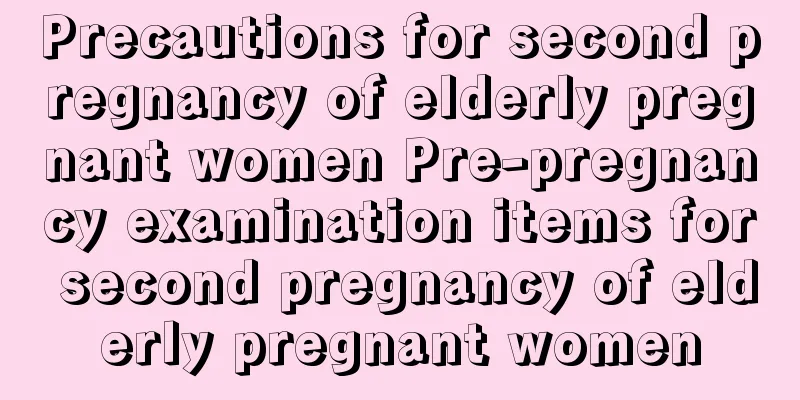Precautions for second pregnancy of elderly pregnant women Pre-pregnancy examination items for second pregnancy of elderly pregnant women

|
With the opening of the second-child policy, many families are eager to have a second child. For those older mothers, there are many things to pay attention to when getting pregnant with a second child. Today, I will share with you some things that older pregnant women should pay attention to when getting pregnant with a second child. Pre-pregnancy preparation for older mothersElderly women must pay attention to the following issues before pregnancy: First, they need to consult, collect medical history, and conduct medical examinations on the elderly couple before pregnancy to fully understand their physical, psychological, nutritional, social, environmental, and family history, reproductive history, medical history, and medication history. Secondly, on the basis of routine pre-pregnancy physical examinations, targeted examinations should be conducted based on the specific conditions of the elderly couple. Older women generally need to undergo a fertility assessment before pregnancy. This mainly includes sex hormone level measurement, ovulation monitoring, ultrasound examination, and hysteroscopy when necessary. The indicators for evaluating women's ovarian reserve capacity include anti-Mullerian hormone (AMH), basal follicle stimulating hormone (FSH), estradiol (E2), and basal antral follicle number (AFC). Currently, the strongest independent predictors of ovarian reserve recognized at home and abroad are AMH and AFC. Secondly, ultrasound monitoring is needed to see if ovulation is normal, and then to understand whether the corpus luteum function is normal after ovulation. If there is an adverse pregnancy outcome, it is necessary to understand its occurrence, development, and treatment process in detail. Each adverse pregnancy outcome should be analyzed to determine the examinations that need to be performed. In addition, attention should be paid to the examination of chronic diseases and infectious diseases, because as women age, the probability of suffering from basic diseases increases, such as autoimmune diseases, thyroid dysfunction, hypertension, diabetes and other basic diseases, as well as heart, liver and kidney function, etc. The chronic diseases suffered by elderly women should be examined and evaluated in specialists to determine the impact of the disease itself on health and life, whether they can withstand pregnancy and the possible impact on the fetus. If the elderly woman and her husband are exposed to adverse environmental factors in the workplace, relevant examinations should be carried out. Must-check items for older pregnant womenAdvanced pregnancy: 9 essential examinations Pregnancy at an advanced age, especially for a second child, requires a pre-pregnancy check-up. The following 9 checks are required: 1. Routine gynecological examination: This is essential. Many older women may have a history of abortion or IUD insertion. They can combine B-ultrasound and other auxiliary examinations to understand whether they have pelvic inflammatory disease or endometriosis, which can reduce the chances of ectopic pregnancy or placenta previa, placenta accreta and other problems. 2. Gynecological B-ultrasound: understand the uterine morphology, endometrial thickness, ovarian size, follicle base number, etc., and predict the ovarian reserve function. 3. Infection-related factors: Check leucorrhea and blood tests to find out whether you have Trichomonas, fungus, mycoplasma, cytomegalovirus infection, rubella virus infection, etc. These factors may affect pregnancy or cause fetal malformation or miscarriage. 4. Endocrine examination: Endocrine hormone examination (check on the 2nd to 5th day of menstruation), thyroid function, anti-Mullerian hormone (AMH), etc. are very important. Endocrine hormones, pelvic B-ultrasound, etc. can be used to evaluate the function of the ovaries. Abnormal endocrine function can affect ovulation and reduce the chance of pregnancy. 5. General examination: such as blood routine, coagulation function, blood type, liver and kidney function, blood sugar, blood lipid and other routine examinations. 6. Antibody test: Check for anti-sperm antibodies, anti-lecithin antibodies, anti-endometrial antibodies, lupus factors, etc. These factors affect conception or miscarriage. 7. Metabolic related tests: such as folic acid metabolism, trace element tests, deafness gene tests, etc. 8. Chromosome and gene examination: In Guangdong, Guangxi and other regions with high incidence of thalassemia, both parents should undergo thalassemia gene testing. For older mothers, due to the relatively poor quality of their eggs and high deformity rate, if they have had repeated miscarriages before, it is best for both husband and wife to undergo a chromosome examination. 9. Environmental inspection: Check the environment with odor, for example, the formaldehyde content of newly renovated houses should be tested to avoid pollutants affecting the health of the fetus. Eugenics and good parenting: weight, thyroid, liver and gallbladder should also be checked In order to make the baby healthier, we should not only pay attention to various fertility-related indicators, but also some routine examinations on maternal and child health should not be ignored: 1. Body mass index: If your body mass index is >25, you should pay attention to reducing your weight to a normal range through diet and exercise, otherwise the risk of gestational hypertension, gestational diabetes, and miscarriage will increase significantly. 2. Monitor blood pressure: focus on the two peak time periods, early morning and 4-6 pm. If blood pressure is >140/90 mmHg, you need to go to the hospital for a check-up to detect problems in time. 3. Blood sugar and blood lipid status: Check blood sugar and glycosylated hemoglobin 2 hours after a meal to understand the status of sugar metabolism in the body; blood lipid examination is also critical, as elevated blood lipids will increase the risk of pregnancy thrombosis. 4. Thyroid function: Thyroid function must be checked before pregnancy, as the development of the fetus cannot be without the supply of maternal thyroid hormone. 5. Liver and gallbladder ultrasound: Check whether there is fatty liver and other conditions. It is best not to get pregnant with fatty liver. Precautions for older pregnant women1. Reduce the physiological disadvantages of old age Because advanced age can lead to egg aging, chromosome aberration, nondisjunction, egg dysplasia, and gene mutation, etc., these are the first problems to be solved and prevented. At this time, advanced women should first deal with the disadvantages of age on fertility, and what they usually need to do is to regulate their menstrual cycle, increase the frequency of sexual intercourse, and shorten the long menstrual cycle to about 28 days. This can increase the activity and metabolic capacity of the ovaries, and can be monitored through physiological hormones and follicles, and comprehensive fine-tuning of dysplastic follicles can be performed. 2. More detailed pre-pregnancy examination The pre-pregnancy check-up for older women requires many more items than that for normal women, such as Pap smear, reproductive endocrine examination + progesterone test after ovulation, ovarian reserve function, salpingography, breast scan or electrocardiogram, anti-sperm antibodies, fluid perfusion, antiphospholipid antibodies, and anti-endometrial antibodies. These are all normal and mandatory examination items. In addition, female diseases such as endometriosis, ovarian cysts, uterine fibroids, premature ovarian failure, cervical erosion, breast tumors, etc. are very common at the age of 35, so these diseases need to be excluded, and if they exist, they must be treated as soon as possible. 3. Actively prevent pregnancy complications Because older pregnant women are particularly prone to pregnancy complications, they must consume sugar, salt, and fat appropriately, distribute their diet reasonably, and try to keep the baby's weight within the range of 6 to 7 pounds. In addition, more detailed health care is required during pregnancy to actively avoid pregnancy complications. It is recommended to do some appropriate exercise before pregnancy and before delivery, take in a reasonable amount of nutrition, control weight, and must undergo prenatal diagnosis, and try to achieve natural delivery. In addition, older pregnant women must undergo prenatal diagnosis and B-ultrasound screening for fetal abnormalities. If they are undergoing in vitro fertilization, they must undergo pre-implantation genetic diagnosis before implantation in the uterus. After a successful normal conception, chorionic villus sampling can be performed at 7 to 9 weeks of pregnancy, or amniocentesis can be performed at 15 to 18 weeks of pregnancy, or umbilical cord puncture can be performed at 24 to 28 weeks of pregnancy. 4. Do not blindly preserve the fetus during miscarriage For older mothers, if a miscarriage occurs in the early pregnancy, it is recommended not to take measures to preserve the fetus, otherwise it is easy to retain the embryo that should have been eliminated. It is not a big deal if the fetus is just a little bit not very smart or not very healthy. The most feared thing is the fetus with defects such as mental retardation, congenital blindness, and deafness that cannot be diagnosed before birth. |
Recommend
Will pregnant women gain weight due to edema? How long will it take for pregnant women to recover from edema?
Many mothers will experience edema in the late st...
Is dwarfism hereditary? How does dwarfism manifest in infancy and childhood?
Dwarfism is becoming less and less common nowaday...
Which kind of milk is good for children? 4 benefits of drinking milk regularly
Milk is a drink that many people like very much. ...
Will the baby be hungry if he doesn't want to drink milk? What should I do if the baby resists milk powder?
There are many reasons why babies don't want ...
What to do if your baby cries after caesarean section? Why does he cry so much?
Babies born by caesarean section are more sensiti...
Can babies with constipation take probiotics to treat it? What probiotics can babies with constipation take?
Babies usually have very fragile stomachs, so if ...
What games to play with babies aged 0-6 months to make them smarter
Babies aged 0-6 months are still very young and c...
Why do pregnant women drool when they sleep?
When we sleep, we often find that when we wake up...
What is the matter with the black hair on the newborn's ears? Pay attention to two situations
The ears are important organs and need our good p...
At what age can a baby use a pacifier? Can a baby sleep with a pacifier in his mouth?
The function of a pacifier is to soothe the baby&...
What medicine should be taken for neonatal jaundice? How to detect neonatal jaundice?
Many newborn babies will suffer from jaundice, an...
What to do if your two-year-old baby likes to hit people? Reasons why your two-year-old baby likes to hit people
Babies always experience various things in the pr...
Postpartum nutrition weight loss meal Postpartum healthy weight loss recipe three meals a day
I believe that many women have had obesity proble...
What are the reasons why babies suddenly don't like to eat milk?
It is very common for babies to breastfeed. Somet...
What are the symptoms of teething in babies? Will teething cause loss of appetite in babies?
Teething is something that every child will exper...









